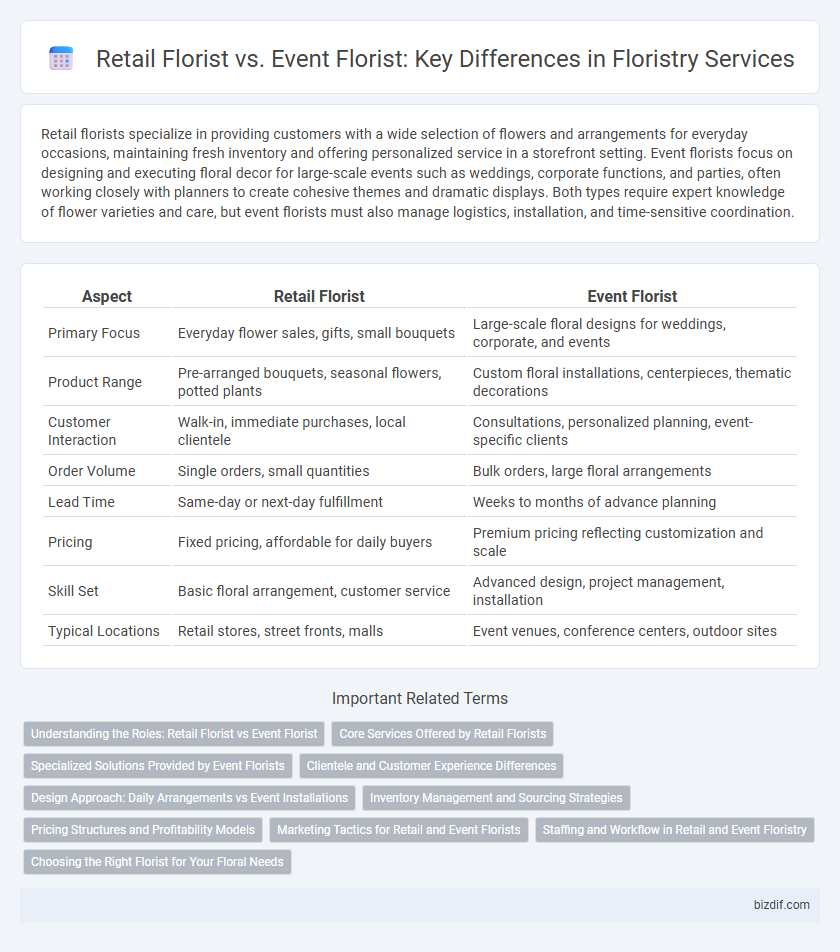Retail florists specialize in providing customers with a wide selection of flowers and arrangements for everyday occasions, maintaining fresh inventory and offering personalized service in a storefront setting. Event florists focus on designing and executing floral decor for large-scale events such as weddings, corporate functions, and parties, often working closely with planners to create cohesive themes and dramatic displays. Both types require expert knowledge of flower varieties and care, but event florists must also manage logistics, installation, and time-sensitive coordination.
Table of Comparison
| Aspect | Retail Florist | Event Florist |
|---|---|---|
| Primary Focus | Everyday flower sales, gifts, small bouquets | Large-scale floral designs for weddings, corporate, and events |
| Product Range | Pre-arranged bouquets, seasonal flowers, potted plants | Custom floral installations, centerpieces, thematic decorations |
| Customer Interaction | Walk-in, immediate purchases, local clientele | Consultations, personalized planning, event-specific clients |
| Order Volume | Single orders, small quantities | Bulk orders, large floral arrangements |
| Lead Time | Same-day or next-day fulfillment | Weeks to months of advance planning |
| Pricing | Fixed pricing, affordable for daily buyers | Premium pricing reflecting customization and scale |
| Skill Set | Basic floral arrangement, customer service | Advanced design, project management, installation |
| Typical Locations | Retail stores, street fronts, malls | Event venues, conference centers, outdoor sites |
Understanding the Roles: Retail Florist vs Event Florist
Retail florists specialize in daily customer service, offering pre-arranged bouquets, custom floral designs, and plant sales tailored for personal occasions. Event florists focus on large-scale projects, designing and installing floral arrangements for weddings, corporate events, and special celebrations, requiring logistical coordination and creativity. Understanding these roles helps clients choose the right expert based on occasion complexity and floral needs.
Core Services Offered by Retail Florists
Retail florists primarily offer core services such as daily fresh flower sales, custom bouquet arrangements, and walk-in customer consultations. They provide seasonal floral designs, holiday-themed arrangements, and gift packaging tailored for individual customers. These services emphasize convenience, personalization, and quick fulfillment, distinguishing them from event florists who focus on large-scale, customized event decor.
Specialized Solutions Provided by Event Florists
Event florists specialize in creating tailored floral arrangements that match the specific theme, venue, and atmosphere of weddings, corporate events, and large celebrations. They provide customized design concepts, including intricate centerpieces, floral arches, and elaborate installations that require advanced techniques and coordination with event planners. Unlike retail florists who focus on everyday bouquets and general floral needs, event florists deliver specialized solutions that enhance the overall aesthetic and experience of high-profile occasions.
Clientele and Customer Experience Differences
Retail florists primarily serve walk-in clients seeking everyday floral arrangements, offering a personal, in-store shopping experience with immediate product availability. Event florists cater to clients planning special occasions like weddings or corporate events, providing customized designs and coordinated services to meet specific themes and timelines. The customer experience for event florists emphasizes collaboration, detailed consultation, and delivery, contrasting with the convenience and spontaneity valued by retail florist customers.
Design Approach: Daily Arrangements vs Event Installations
Retail florists specialize in daily floral arrangements that emphasize versatility, seasonal blooms, and quick turnaround to meet routine customer needs. Event florists focus on large-scale installations requiring intricate design planning, thematic coordination, and customized flower selections tailored to specific celebrations or corporate events. The design approach for retail is centered on efficiency and broad appeal, whereas event floristry demands creativity, structural expertise, and collaboration with event planners.
Inventory Management and Sourcing Strategies
Retail florists maintain diverse, ready-to-sell stock, sourcing from local flower farms and wholesalers to ensure fresh, seasonal blooms available daily. Event florists plan inventory meticulously, often ordering specialty flowers and greenery weeks in advance, leveraging direct grower relationships or international suppliers for unique, high-demand varieties. Effective sourcing strategies for both rely on balancing cost, quality, and availability to meet specific customer needs and optimize inventory turnover.
Pricing Structures and Profitability Models
Retail florists typically implement fixed pricing structures based on individual flower costs and arrangement complexity, allowing for predictable profit margins per sale. Event florists adopt customized pricing models that factor in labor, venue logistics, and large-scale flower sourcing, leading to higher profitability per project but increased pricing variability. Profitability for event florists often hinges on volume and premium service charges, whereas retail florists rely on steady sales and markup consistency.
Marketing Tactics for Retail and Event Florists
Retail florists boost visibility through local SEO, social media advertising, and targeted promotions focusing on seasonal flowers and gift occasions. Event florists leverage networking with wedding planners, vendors, and utilizing portfolio-driven Instagram campaigns to attract high-value clients. Both sectors benefit from email marketing, but event florists emphasize personalized consultations and showcasing bespoke floral designs to secure bookings.
Staffing and Workflow in Retail and Event Floristry
Retail florists typically manage a steady flow of daily customers with a small, versatile team focused on arranging standard bouquets and handling walk-in sales, emphasizing efficiency and multitasking in a compact workspace. Event florists require larger, specialized teams coordinated for large-scale, time-sensitive projects involving intricate designs and on-site installations, often working long hours under tight deadlines. Workflow in retail floristry centers around quick turnaround and maintaining inventory, while event floristry demands detailed project planning, collaboration with vendors, and flexible staffing to accommodate fluctuating event schedules.
Choosing the Right Florist for Your Floral Needs
Choosing the right florist depends on the type of floral needs: retail florists specialize in everyday arrangements, bouquets, and small-scale purchases, offering convenience and variety for personal use. Event florists focus on large-scale, customized floral designs tailored for weddings, corporate events, and special occasions, emphasizing creativity and detailed planning. Evaluating the scope, style, and scale of your event ensures selecting a florist who can deliver the appropriate floral expertise and service.
Retail Florist vs Event Florist Infographic

 bizdif.com
bizdif.com